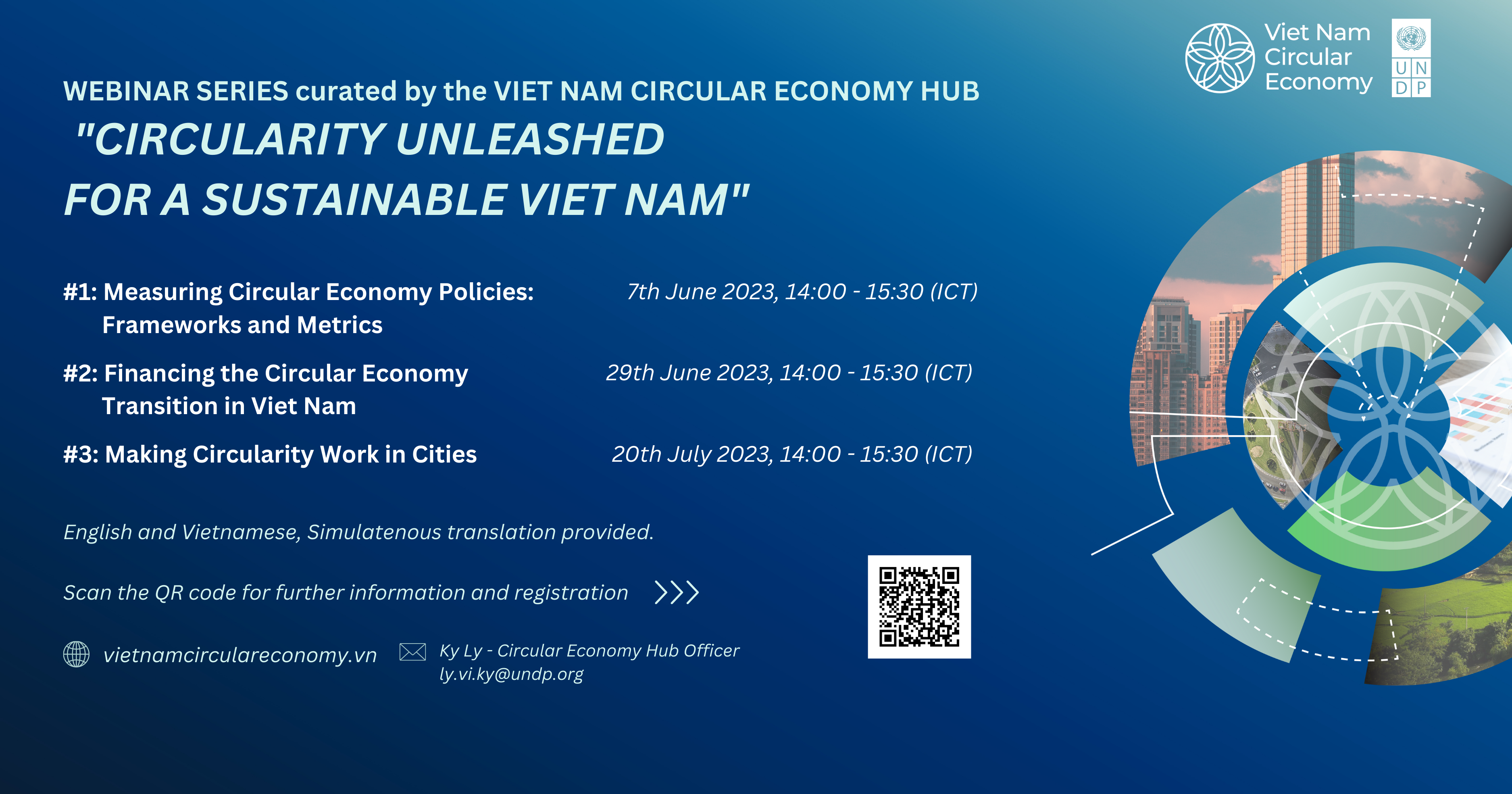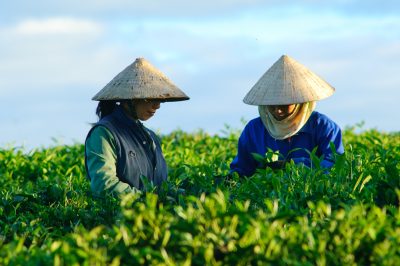
I. Background
Viet Nam has become a global success story thanks to its fast transition from one of the poorest countries in the world in the 1980’s to the dynamic, middle-income economy that we know today. However, growth and development have not come without costs. Industrialization and extractive industries have taken a heavy toll on the environment.
Viet Nam is now at a crossroads. The country can either go back to the pre-COVID-19 linear and extractive economy or pursue a green recovery pathway by framing a larger vision of success that includes the transition towards Circular Economy (CE) and advance a Circular Economy Rebound that encompasses building resilience to future shocks and pivoting towards a new inclusive and green trajectory.
Circular Economy offers a promising alternative strategy for industrial development and job creation to the traditional manufacturing-led growth pathway. The transition to a Circular Economy is cross-topics and multidisciplinary. It includes fast-tracking inclusive innovation, tapping into evolving global markets, protecting and regenerating the environment, access to public and private global finance, higher wages, more livable and productive cities, and reduced poverty.
The Viet Nam Circular Economy Hub (CE Hub) is organizing a webinar series to enhance dialogue, generate know-how, and mobilize collective action towards the CE transition, by engaging and building the capacity of all stakeholders, creating synergies and integrating financial and technical resources.
II. Audience and Format of the Webinar Sessions
The webinars will take place in Vietnamese and English languages. They are open to everyone interested to discuss and engage in possible future joint activities in support of the Circular Economy transition in Viet Nam. The series of webinars will be recorded and uploaded on the website of the Viet Nam Circular Economy Hub , along with the key resources and references highlighted by the speakers and the participants.
Target audience:
- Universities and research institutions
- Policy makers at the national and provincial levels
- CSOs and NGOs
- Students and Youth
- Business
- Circular Economy Practitioners from the ASEAN region
Each session will comprise 2-4 short presentations from Vietnamese and international experts and will be followed by a 30-minute discussion moderated by UNDP Viet Nam. The outcomes of the webinar series will be curated and synthesized into open-source publications to serve current and future programmes and helped designed new and transformative partnerships.
III. Webinar Sessions
- Measuring Circular Economy Policies: Frameworks and Metrics – 14:00, Wednesday 7th June 2023
The Institute of Strategy, Policy on Natural Resources and Environment (ISPONRE) is tasked with the formulation of the National Action Plan on Circular Economy, which will set out tasks and roadmaps covering specific fields and industries, investment projects, and prioritised solutions and will be enacted in December 2023. Crafting a monitoring framework that includes measurable, achievable and meaningful indicators is critical to this NAP on CE. Discussions are underway to agree and assess what to measure and define the best approach to define analytics and targets and allocate monitoring responsibilities.
The aim of this session is to present and discuss the proposed indicators for the NAP on CE and learn from international experiences in setting up a robust M&E framework.
Guest speakers:
- “International Best Practices in Metrics and Indicators for CE Roadmaps”, Arpit Bhutani, COO, Circular Innovation Lab
- “A proposal for CE indices to be included in CE NAP” – Carlo Lupi, UNDP expert
- “Development of a policy evaluation tool for formulating a NAP for CE in Vietnam“ – Hideki Wada, Vietnam Waste Planning
- Financing the Circular Economy Transition in Viet Nam – 14:00, Thursday 29th June 2023
Viet Nam is in the process of transforming its growth model to a model based on increased productivity, value addition, innovation and competitiveness. However, the transition through the development continuum has resulted in a significantly shifting financing landscape: fast-declining direct grant ODA, a declining tax-to-GDP ratio, and a need for more public financing and alignment in priorities. It is time for the financial services sector to capitalise on new growth and investment opportunities .
Equally important is the need for the government to provide the financial sector with the enabling policy and legislative framework and incentives to integrate CE concepts into financial products and services and post-pandemic economic support programmes. Therefore, achieving CE transition and Viet Nam’s climate targets – more than ever – requires a systemic intervention approach that engages multiple stakeholders and levers of change.
This session aims to review different financial mechanisms that can be leveraged to support the Government of Viet Nam and SMES in adopting circular practices.
Guest speakers:
- “Scaling up Circular Economy Finance” – Jan Raes, UNEP FI Lead Finance and Plastics, Circular Economy & Pollution, UNEP FI
- “Green credits for CE transition in Viet Nam” – Lai Van Manh, Head of Economic, Natural Resources and Environment Department, ISPONRE
- “Financing Circular Economy transition in the textile industry” – Vu Minh Nguyet, Project Officer, GIZ Viet Nam
- Making Circularity Work in Cities – 14:00, Thursday 20th July 2023
Urbanisation rates in Viet Nam are skyrocketing, and are expected to reach 50% by 2030. The circular economy holds a promise of reduced environmental pollution, socio-economic development, cost-efficiency, and efficient use of natural resources. Faced with increasing air, land, water pollution challenges, high urbanization rates, and climate impacts, cities in Viet Nam and around the world quickly seize the opportunities that a strategic, fully-fledged, sector-wide CE transition could bring.
However, the transition to CE in cities is not only an economic, but also a social imperative as living conditions deteriorated, health impacts of air pollution worsen the quality of life, and climate risks, are increasing in severity and frequency. Should the cities wait too long they concur with the risk of detaining stranded assets, that won’t have the capacity to future-proof.
This session showcases examples and case studies from cities in Viet Nam and ASEAN that have embarked on the circular transition. It highlights the various approaches, methodologies, and viewpoints to do so; from grassroots experimentation, evidence-based scientific research, top-down climate goals, and citizen innovations.
Guest speakers:
- “A practical approach to propose a circular economy roadmap for Thua Thien Hue” – Cao Quoc Hai, Deputy Director, Hue Innovation Hub
- “Developing a circular economy roadmap in Da Nang: Key insights and lessons learned” – Ms. Bui Ngoc Nhu Nguyet, Chief of Staff, Da Nang Institute for Socio-Economic Development (DISED)
- “Bioclimatic and circular trajectory for the major Parisian train stations” – Fabien Clavier, International Business Development Manager, AREP
IV. Registration link
V. Contacts
- Ky Ly – Circular Economy Hub Officer – ly.vi.ky@undp.org
- Morgane Rivoal – Climate Change and Circular Economy Officer – morgane.rivoal@undp.org
VI. Records and materials















